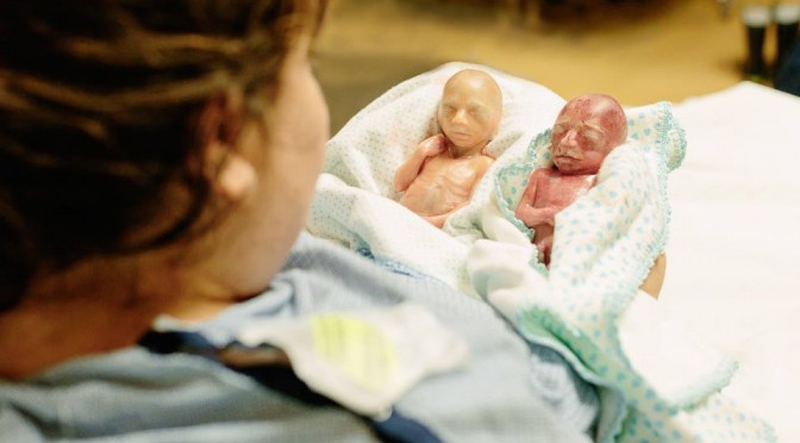Miscarriage is actually a spontaneous abortion. It means that your pregnancy could not develop due to certain complications. Miscarriages are more common in the first trimester; in fact, more than 80% of all miscarriages happen during the first trimester and a large percentage of these occur in the first week of pregnancy. Your body goes through so many changes during the first trimester – the embryo implants itself to the uterine wall, its cells divide to form organs, and your immune system reacts to all these new changes in a specific way. So many things can go wrong at this time, but it is also possible to have a late miscarriage. So what leads to a miscarriage at 20 weeks? Can you do anything about it? Let's find out now!

Signs of Miscarriage at 20th Week
Late miscarriages are much less common but possible, and that is why it is important to have some idea about the signs associated with it. For instance:
You are likely to have heavy vaginal bleeding with strong, labor-like cramps.
You may have heavy bleeding that contains blood clots.
Your water may break early and you may have to go into labor very early.
You may notice your baby's movement become very slow or even change considerably.
These are some common symptoms Miscarriage at 20 Weeks, but you may feel different depending on when you experience a miscarriage.
Signs of Miscarriage at Other Weeks
0 to 6 Weeks
Most women do not even realize that they were pregnant and have actually miscarried. They believe that they just had a painful and heavy period. You may consider taking a pregnancy test at this time. This will help you confirm if you have been pregnant. If you take the test a couple of weeks after that period-like bleeding, it would not help a lot.
6 to 12 Weeks
If you miscarry during this period, you are likely to experience pelvic pain, cramping, and bleeding. The bleeding is usually not heavy in the beginning and start as spotting. It keeps increasing over time and will eventually become heavier than your regular menstrual period. Similarly, the cramps will become intense in the course of a day or two.
12 to 19 Weeks
You may experience certain signs when you have a miscarriage during this phase. For instance, you may not feel any movement of your baby. There will be vaginal bleeding or at least some spotting. You may have severe pain in your abdomen and back. You may pass tissue or fluid through the vagina.
What Causes Miscarriage at 20 Weeks (Late Miscarriage)?
Sometimes, it is not possible to pinpoint the exact reason for a late miscarriage. However, you miscarry when there is a chromosomal problem or your baby has a developmental issue. And, in most cases, the problem happens during fertilization when the number of chromosomes passed from parents is wrong. This could lead to conditions likes Patau's syndrome or Edward's syndrome. A miscarriage can also happen due to a neural tube defect or heart defect.
Your risk of having a miscarriage increases with age, and that is mainly because this increases risk of chromosomal abnormality. If you become pregnant at 30, your risk of miscarriage is one in ten. It goes to one in four when you become pregnant between the ages of 35 and 39. Sometimes, your miscarriage is due to a health problem you may already have. It could be because your womb has an abnormal shape or there is a problem with cervix. It could also be due to a condition called sticky blood syndrome that increases blood clotting.
If you have a preexisting condition meddling with your hormones, such as thyroid disorder or diabetes, you are also at an increased risk of having a miscarriage at 20 weeks. Women with polycystic ovaries have a higher risk of experiencing late pregnancy loss. And in some cases, you may have a failed pregnancy due to an infection, such as the flu. Keep in mind that some infections can cross the placenta and reach your baby. Toxoplasmosis is an example. Similarly, a vaginal infection can also result in a miscarriage.
What Happens After the Miscarriage?
How you feel after the miscarriage usually depends on the stage of your pregnancy and the underlying cause of the miscarriage. Sometimes, your doctor may ask you about touching or seeing your baby. It can be a difficult decision to make at this time and may determine how you are going to deal with your loss in the coming days.
Sometimes, parents want to see their baby, but they hesitate because they have concerns about what he/she may look like. Your doctor can guide you in this regard and help you make a decision. You may even ask for some photos first and then decide if you really want to see or touch them.
In some cases, parents decide to create memories, such as handprints, photographs, or even a lock of hair to help feel better about their loss. However, that is not the case with all parents, and you have to understand that there is nothing wrong in deciding that you do not want to see your baby.
Be sure to use whatever help you can find to feel better after your loss. Hospitals usually have chaplains that may offer spiritual support in this situation. You can also find a multi-faith room in your hospital and spend some time there to overcome your loss. Whatever you do, just keep in mind that having a miscarriage does not mean that you are going to experience the same in your next pregnancy.
View All Comments /Add Comment